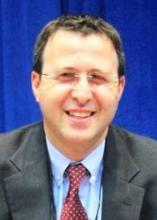SAN ANTONIO – An oral investigational agent that blocks cell cycle progression may expand treatment options for the most common type of breast cancer, the results of a randomized phase II trial suggest.
Combining the agent, called PD 0332991, with letrozole (Femara) as first-line therapy for advanced estrogen receptor (ER)-positive, HER2-negative disease more than tripled median progression-free survival, lead investigator Dr. Richard S. Finn reported at the San Antonio Breast Cancer Symposium.
The response rate also was better with the combination, but there were no complete responses.
PD 0332991 inhibits cyclin-dependent kinase 4/6, and thereby interferes with the action of the retinoblastoma (Rb) protein, arresting cells between the G1 and S phases of the cell cycle. Benefit appeared to be consistent regardless of the time to relapse, whether disease was recurrent or de novo, and irrespective of whether the tumor had cyclin D1 gene amplification or p16 gene loss (perturbations affecting the cell cycle).
There was an increase in grade 3/4 adverse events mainly driven by an increase in those of hematologic nature.
"PD 0332991 when added to letrozole provides a dramatic and unprecedented improvement in progression-free survival in this population," commented Dr. Finn of the Jonsson Comprehensive Cancer Center at the University of California, Los Angeles.
"These results confirm our observations made preclinically that PD 0332991 has activity in ER-positive breast cancer, as well as highlight the synergy that we observed in the laboratory. It is very important to remember that this molecule is well tolerated, that the toxicity profile was very manageable," he added.
On the basis of these positive findings, the investigators are planning a phase III trial that should open in 2013.
Many Questions for Investigator
The presentation drew comments and questions from breast cancer specialists in the audience.
Attendee Dr. Larry Norton of Memorial Sloan-Kettering Cancer Center, New York, noted, "When one sees a disconnect between progression-free survival and response rate, one must think that maybe there is an effect on metastasis or new sites of disease. There’s two ways, obviously, that you can progress: in prior sites of disease vs. new sites of disease.
"Have you divided that out in this study, and are you having an antimetastatic effect?" he asked. "This pathway clearly relates to many mechanisms of metastasis."
"Certainly, that’s a potential mechanism," Dr. Finn replied. "We have not teased that out. I would say that if we are inducing cell cycle arrest and having a cytostatic effect, that could be having an effect in the metastatic sites or the measurable sites, regardless."
Another attendee noted that in such patients, letrozole monotherapy usually achieves a median progression-free survival on the order of 9.5 months, whereas the value in the trial was 7.5 months. "Why did the control arm do so badly?" he asked.
Dr. Finn noted that the values did not differ greatly, that the patient population was heterogeneous (including some who had previously received hormonal therapy), and that cross-trial comparisons are problematic. "Even with all that taken into consideration, the magnitude of benefit that we are seeing, even if the control arm did 9 or 11 or 12 months, this magnitude of benefit is so significant that this is clearly a signal that this molecule has a role in this disease," he maintained.
Dr. Frankie Ann Holmes of Texas Oncology in Houston, who also attended the session, wondered, "So if in all of the parameters you have studied, you couldn’t find a biomarker, do you have a hypothesis? Are you going to find a biomarker, or is it just such a big difference, we don’t really need to drill down?"
"We do have a biomarker: That biomarker is ER," Dr. Finn replied. "The most important genomic event that probably is related to sensitivity to this compound is having an intact Rb pathway. And it would appear that ER positivity is a marker for an intact Rb pathway and that explains part of the dramatic benefit that we are seeing."
Most Women Had Stage IV Disease
Women were eligible for the trial, formally known as TRIO-18, if they were postmenopausal and had previously untreated, locally recurrent or metastatic ER-positive, HER2-negative breast cancer.
The trial had two parts. In the first part, 66 otherwise unselected women were randomized evenly to the combination of PD 0332991 and letrozole or to letrozole alone. In the second, exploratory part, 99 patients also known to have cyclin D1 amplification and/or p16 loss were similarly randomized.
The women had a median age of 63 years, and most had stage IV disease. Roughly two-thirds had experienced their relapse within 12 months of adjuvant treatment or had de novo disease.


